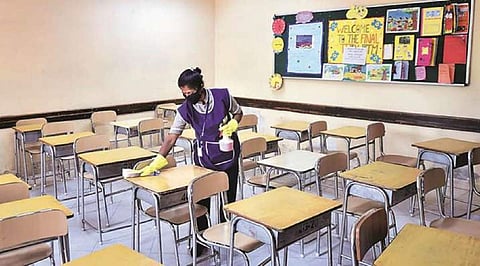

Indian parents want their kids to go back to school and 66 per cent of them do not think that it would be a health risk, found a study conducted by the researchers of Azim Premji University. While states like Tamil Nadu, Goa and Arunachal Pradesh have decided to reopen the schools in a phased manner, Maharashtra is still considering the proposition and Delhi has decided to keep its schools closed till further notice.
Titled Myths of Online Education, the field study includes responses from 1522 school teachers and 398 parents from 26 districts of five states divided into two categories — ones that implemented online teaching in public schools (Chhattisgarh, Madhya Pradesh, and Rajasthan) and two states which hadn't (Karnataka and Uttarakhand). Out of them, 90 (NUMBER OR PER CENT?) wanted their kids back in school. "We asked whether parents were willing to send their children to school when schools reopen with necessary safety precautions. Contrary to popular perception, a majority of parents (90 per cent overall) were willing to do so," said the study. "Reinforcing the above opinion, overall 66 per cent parents also shared that they did not think schools would be a cause of any problem for their children’s health after they reopen," it added.
The study also found that teachers and parents are not happy the way classes are being conducted online — 90 per cent of the teachers said that they were unable to properly assess the students over online classes and 80 per cent of them reported that there was no connection between the teacher and their class. "In a 45-minute class, half the time goes in saying “hello-hello” as the network is bad and girls cannot hear properly and keep saying. It is very difficult to teach even with three or four girls. I do not know how it would be if all the students connected to the class," said a teacher in a girls school in Raipur, Chhattisgarh. "Attendance is a very big issue. It is quite unusual for us to conduct classes with 2-3 children. Out of 14 children, only 4 have been able to join the class. Network issues also affect the classes," added another teacher from Dhamtari, Chhattisgarh.
Teachers were asked whether assignments were given to the children during the online classes and in the implementing states, around 17 per cent of the teachers had not given any assignments. "From among the teachers who had given assignments, 44 per cent reported that children were not able to complete those. The parents' survey revealed concerns that could possibly explain some of the above observations by the teachers — 36 per cent of the parents in the implementing states shared that their children were not able to use the apps for online classes on their own," added the study.
Complaints of students disturbing the class or giving the teachers a hard time have all been reported earlier by Edex. Several videos of students bullying teachers during online classes have gone viral on Youtube and other social media platforms. While some changed their names to display that of adult movie star Mia Khalifa and terrorist mastermind Osama Bin Laden, others played songs with explicit lyrics and even smoked on video. The problem does not stop there. Class assessment becomes useless if the student cheats in every single one of them and there's no way the teacher can prove it.
It takes a toll on the teacher, said Chaya Bhargava, a teacher at Laksh Academy. "I had spent about three hours making the questionnaire on Google Forms and its really disheartening to see that it was of no use. The students just cheated through it. I started to question whether my paper was not worth it," said Chaya.
Online learning platforms and modes of online teaching are not a part of the regular feature of the public school system or for that matter, the school system at large in India and more than half the teachers (54 per cent), said that their knowledge and user-experience of such platforms and modes of teaching were inadequate, stated the study. "Only around 50 per cent of the teachers were found to engage with children daily, while the rest engaged with online classes at a much lesser frequency," said the study. "Around 75 per cent of the teachers spent, on an average, less than an hour per day on online classes for any grade. Responses of both teachers and parents suggest that, on an average, in at least 80 per cent of the instances, only an hour or less per day is spent by the teachers per grade on online classes," it added.
The study suggested that not only do the schools need to be reopened, there is a "need to adopt context-based, direct teaching-learning solutions with the physical presence of teachers during the transition period of the reopening of public schools".
